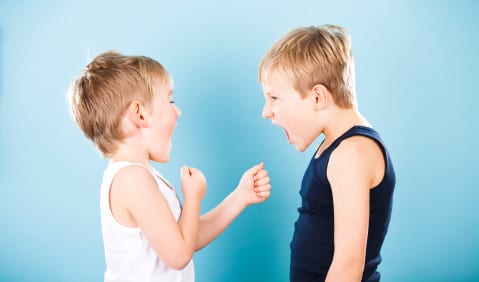 “If a kid hits you, walk away,” a mother said to her son one bright sunny afternoon at the park.
“If a kid hits you, walk away,” a mother said to her son one bright sunny afternoon at the park.
“No,” another mom shook her head emphatically as the little boy walked back to the group of kids playing in the sand. “He should stick up for himself and hit back.”
The first mom looked at her friend incredulously.
“Hey, he needs to learn now so when the day comes he can protect himself,” shot back the second mom.
I listened as the two continued to debate whether or not to teach their children to hit, with an equally shocked look spreading across my own face. But it wasn’t only because of the second mom’s perspective that kids should be taught how to fight back. It was more that she was of the fatalistic mindset that the day would surely come when the boy would have to fight back. That it was inevitable her friend’s child would need to protect himself because some day someone might harm them.
I’m not naïve. I know we don’t live in a utopian society. Tempers flare, people fight. Conflict seems to be the one constant since the beginning of time. But teaching children so early about how to stick up for themselves, and defend themselves should another person want to hurt them? Ugh. I never wanted to think about this.
As a young girl I had my share of squabbles, but those were mostly nasty letters or screaming matches. And even though no punches were thrown, they left their own scars in a way. Hurtful words exchanged can sometimes be more powerful than a kick or a punch. But more importantly, if I teach my child how to protect himself by telling him that someone might want to hurt him, won’t that shatter his peaceful view of the world?
When I was in college, I saw David Peltzer speak. David is a victim of what has been called the worse case of child neglect and abuse in US history. His books “A Child Called It” and “Lost Boy” tell David’s story of abuse and his time in the foster care system after he was rescued. I read both books and can tell you there isn’t a single page that isn’t marked with a tear stain, and in that, I am not alone. It is a truly heartbreaking tale that affects every reader – parent or not.
I learned about David’s speaking engagement shortly after assuming role of Feature Editor for my collegiate newspaper and decided to attend his speech to gather information for an article I was working on about abuse and assault among college co-eds. The subject was especially poignant for me: earlier that year I had been assaulted and had decided the best way to heal and help others was to learn and educate. As I think about David now, I am astounded that despite his childhood, despite the incredible amount of abuse he suffered, the horrible hand he was dealt, he did not turn into a man of violence. That he chooses – to this day – to deal with life’s conflicts without physicality.
It isn’t lost on me, however, that there were times I’ve had to protect myself. And because I had been taught how to defend myself, those situations didn’t leave a mark on me. Not even a scrape. But the potential harm someone had tried to inflict did and though it’s faded, it’s still there. This is what makes me feel that if I can teach my child how to defend himself and prevent any scratch, scrape or scar from reaching him, I will darn well do my best.
I don’t know how my parents did it. They taught me how to defend myself without turning me into someone that naturally turns to violence to resolve a conflict. Maybe it wasn’t my parents. Maybe it was everything about childhood – every fall, scrape, fight or struggle that taught me the way to protect and defend myself. Who knows?! All I know is that I struggle with this as a parent: whether or not to teach my child how to defend himself in a way that the second mom talking on the playground would approve of.
Maybe I won’t have to teach him. Maybe he will find his own answer to managing conflict. In an ideal world, he wouldn’t have to learn. There would be no conflict. Every dispute could be resolved with a handshake. One can only dream. But in today’s world, unfortunately, I think we all bounce between the first and second mom’s opinion from time to time.
How do you teach your children to resolve conflict? Are you a pacifist or do you fight back?





